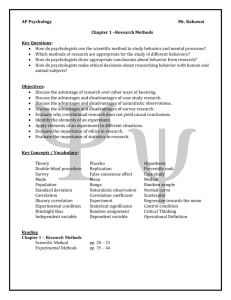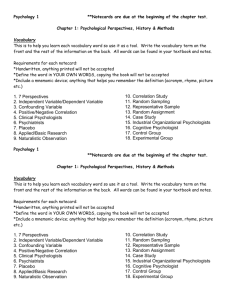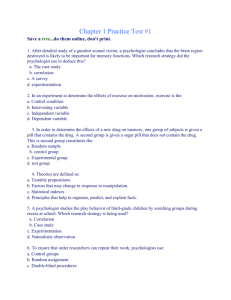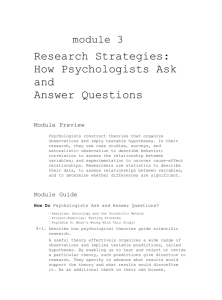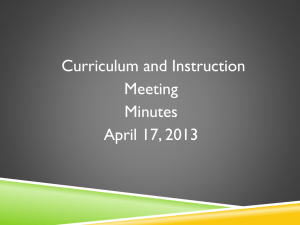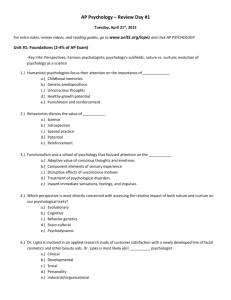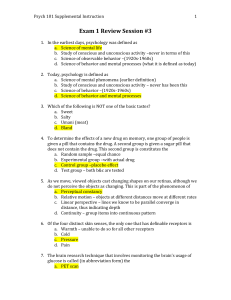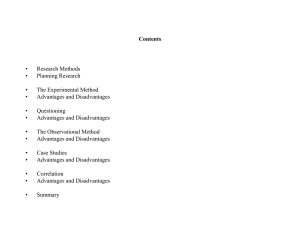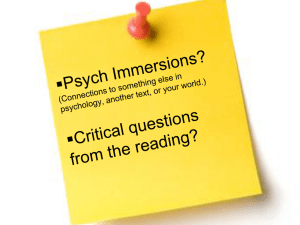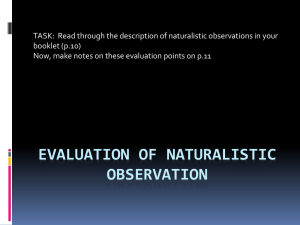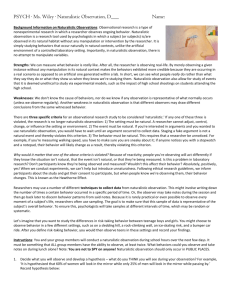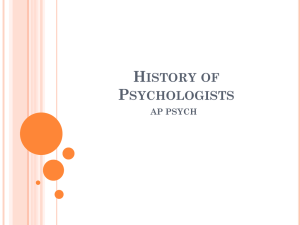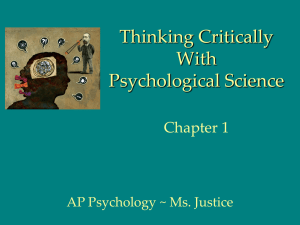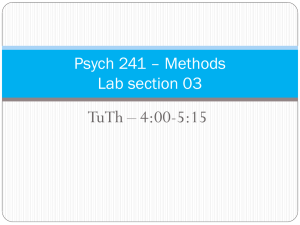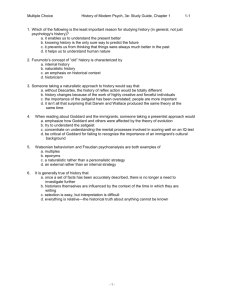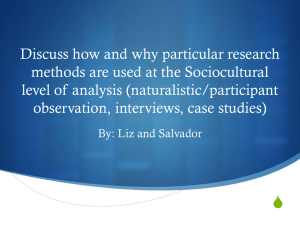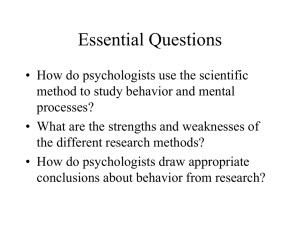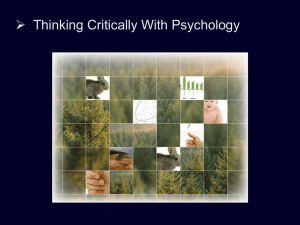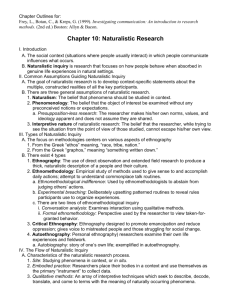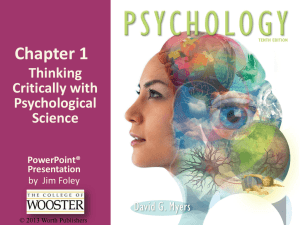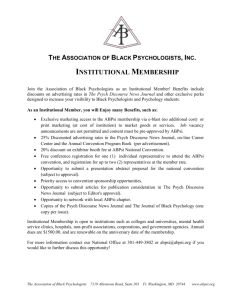Research Methods #1 (ppt notes)
advertisement
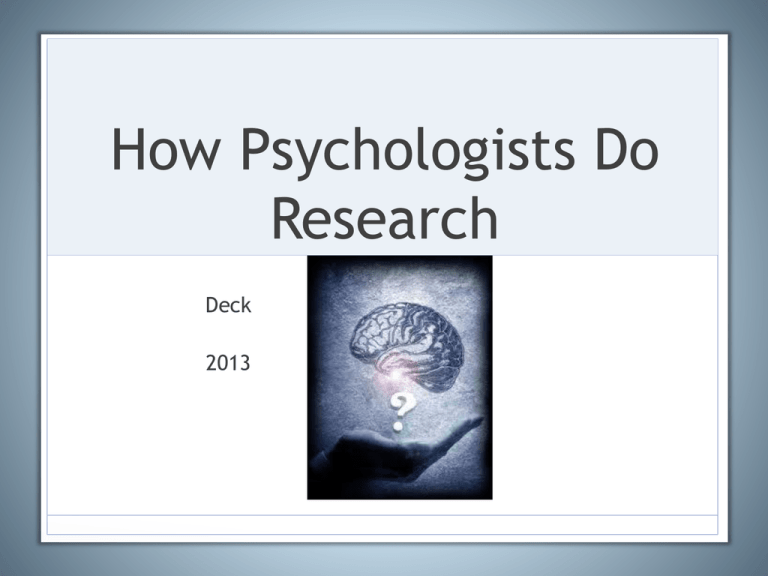
How Psychologists Do Research Deck 2013 Research Methods Used in Psych 1. Case Study 2. Naturalistic Observation 3. Laboratory Observation 4. Test 5. Survey 6. Coorelational Study 7. Experiment 1.Case Study • A case study is an intensive study of a person or group. Most case studies combine long-term observations with diaries, tests, and interviews. • By itself, however, a case study does not prove or disprove anything. The results can not be generalized to anyone else. • They provide a wealth of descriptive material that may generate new hypotheses that researchers can then test under controlled conditions. Remember David Reimer?! 2. Naturalistic Observation • Researchers need to know how people and animals behave naturally, when they are not conscious of being observed during an experiment. • To obtain such information, a psychologist uses naturalistic observation. • The cardinal rule of naturalistic observation is to avoid disturbing the people or animals you are studying by concealing yourself or by acting as inconspicuous as possible. 3.Laboratory Observation • Form of observational study • Sometimes psychologists prefer to make observations in a laboratory setting. • Why do psychologists often observe people’s behavior in laboratories instead of in everyday situations? • Psychologists have more control in this situation • Use of sophisticated equipment Examples… • Psychologists using laboratory observation have gathered valuable information about brain and muscle activity during sleep. • Psychologists using naturalistic observation have studied how people in crowded places modify their gaze and body position to preserve a sense of privacy. 4.Tests • Psychological tests are procedures for evaluating personality traits, emotional states, aptitudes, interests, abilities and values. • Hundreds of psychological tests are used in industry, education, the military and the helping professions • Many tests are also used in research studies • http://www.healthyplace.com/psychologicaltests/ 5. Survey • One of the most practical ways to gather data on the attitudes, beliefs, and experiences of a large numbers of people is through surveys. • A survey may consist of interviews, questionnaires, or a combination of the two. Interviews allow the researcher to observe the participant and modify questions if the participant seems confused by them. Survey Continued… • On the other hand questionnaires take less time to administer and the results are more uniform because everyone answers the same questions. • Questionnaires also reduce the possibility that the researcher will influence the participant by unconsciously frowning at an answer he or she does not like. In interviews, there is always the danger that participants will give misleading answers in order to help themselves gain approval. 6. Correlational Study • A descriptive study that looks for a consistent relationship between two phenomena. • Correlation: a measure of how strongly two variables are related to one another. • All experiments have an outcome, usually the outcome is shown using a graph to determine a correlation. ..\PSYC-Videos\Correlation and Causation [www.keepvid.com].mp4 Negative correlation Hours spent studying Days absent from psych class No correlation Final grade in psych course Final grade in psych course Final grade in psych Positive correlation Minutes spent brushing teeth Practice: Positive/Negative 1. The higher a male monkey’s level of the hormone testosterone, the more aggressive he is likely to be. 2. The older people are, the less frequently they tend to have sexual intercourse. 3. The hotter the weather, the more crimes against persons (such as muggings) tend to occur. Answers: • 1. Positive • 2. Negative • 3. Positive 7. Experiment • A controlled test of a hypothesis in which the researcher manipulates one variable to discover its effect on another. • List famous psychological experiments: • 1. • 2. • 3. • 4. Remember Experimental Design • Scientific Method: Using a consistent method like the scientific method we can ensure truth and validity in our research findings. • 5 Steps • Placebo: an inactive substance or fake treatment used as a control in an experiment or given by a medical practitioner to a patient. • Key Terms: Theory, hypothesis, variables (independent & dependent), single blind/double blind, etc. • SEE HANDOUTS Assignment 1) In a chart - list and describe the advantages and disadvantages associated with each method of research (7). Research Method Description Advantages Disadvantages
